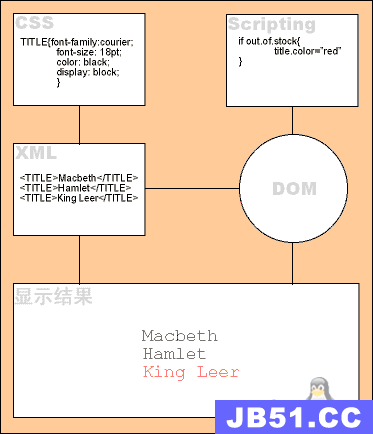XSD(XML Schema DeFinition)是DTD(Document Type DeFinition)替代者的原因,
一是据将来的条件可扩展,
二是比DTD丰富和有用,
三是用XML书写,使用XML语法,结构比DTD简单的多,
四是支持数据类型,更容易地定义数据约束(data facets),验证数据
五是支持命名空间。
XSD用途:
文档设计者可以通过XSD指定一个XML文档所允许的结构和内容,并可据此检查一个XML文档是否是有效的。
XML Schema本身是一个XML文档,它符合XML语法结构。可以用通用的XML解析器解析它。
XSD例子:
<?xml version="1.0"?>
//<schema>是每一个XSD的根元素
//显示 schema 中用到的元素和数据类型来自命名空间 "http://www.w3.org/2001/XMLSchema"。
//同时它还规定了来自命名空间 "http://www.w3.org/2001/XMLSchema" 的元素和数据类型应该使用前缀 xs:
<xs:schema xmlns:xs="http://www.w3.org/2001/XMLSchema"
//被此 schema 定义的元素 (note,to,from,heading,body) 来自命名空间: "http://www.w3school.com.cn"。
targetNamespace="http://www.w3school.com.cn"
//默认的命名空间是 "http://www.w3school.com.cn"。
xmlns="http://www.w3school.com.cn"
//任何 XML 实例文档所使用的且在此 schema 中声明过的元素必须被命名空间限定
elementFormDefault="qualified">
...
...
</xs:schema>
XML引用XSD例子://也可以只保留<note>,使用时通过JAXB来指定XSD
<?xml version="1.0"?>
<note xmlns="http://www.w3school.com.cn"
//指定XSD实例命名空间
xmlns:xsi="http://www.w3.org/2001/XMLSchema-instance"
//XSD位置
xsi:schemaLocation="http://www.w3school.com.cn note.xsd">
<to>George</to>
<from>John</from>
<body>Don't forget the meeting!</body>
</note>
内建的数据类型
xs:string
xs:decimal
xs:integer
xs:boolean
xs:date
xs:time
XSD 简易元素:只包含文本的元素。它不会包含任何其他的元素或属性。
<xs:element name="lastname" type="xs:string"/>
<xs:element name="age" type="xs:integer"/>
<xs:element name="dateborn" type="xs:date"/>
<xs:element name="color" type="xs:string" default="red"/>
<xs:element name="color" type="xs:string" fixed="red"/>
<lastname>Smith</lastname>
<age>28</age>
<dateborn>1980-03-27</dateborn>
XSD 属性
<xs:attribute name="lang" type="xs:string"/>
<lastname lang="EN">Smith</lastname>
XSD 限定(restriction)用于为 XML 元素或者属性定义可接受的值。对 XML 元素的限定被称为 facet。
对值的限定
<xs:element name="age">
<xs:simpleType>
<xs:restriction base="xs:integer">
<xs:minInclusive value="0"/>
<xs:maxInclusive value="120"/>
</xs:restriction>
</xs:simpleType>
</xs:element>
对一组值的限定:枚举约束(enumeration constraint)。
<xs:element name="car">
<xs:simpleType>
<xs:restriction base="xs:string">
<xs:enumeration value="Audi"/>
<xs:enumeration value="Golf"/>
<xs:enumeration value="BMW"/>
</xs:restriction>
</xs:simpleType>
</xs:element>
或
<xs:element name="car" type="carType"/>
<xs:simpleType name="carType"> //carType可以被共享使用。
<xs:restriction base="xs:string">
<xs:enumeration value="Audi"/>
<xs:enumeration value="Golf"/>
<xs:enumeration value="BMW"/>
</xs:restriction>
</xs:simpleType>
对一系列值的限定:正则/模式约束(pattern constraint)。
<xs:simpleType>
<xs:restriction base="xs:string">
<xs:pattern value="[a-z]"/>
//<xs:pattern value="[A-Z][A-Z][A-Z]"/>3个字母
// <xs:pattern value="([a-z])*"/>
//<xs:pattern value="male|female"/>
</xs:restriction>
</xs:simpleType>
restriction的其他一级子元素
<xs:length value="8"/>
<xs:minLength value="5"/>
<xs:maxLength value="8"/>
//将移除所有空白字符(换行、回车、空格以及制表符会被替换为空格,开头和结尾的空格会被移除,而多个连续的空格会被缩减为一个单一的空格)
<xs:whiteSpace value="collapse"/>
//移除所有空白字符(换行、回车、空格以及制表符):
<xs:whiteSpace value="replace"/>
//"XML处理器"不会移除任何空白字符--------"XML处理器",browser-HTML处理器------------
<xs:whiteSpace value="preserve"/>
XSD复合元素:
<xs:element name="employee" type="personinfo"/>
<xs:complexType name="personinfo">
<xs:sequence>
<xs:element name="firstname" type="xs:string"/>
<xs:element name="lastname" type="xs:string"/>
</xs:sequence>
</xs:complexType>
在已有的复合元素之上以某个复合元素为基础,然后添加一些元素:
<xs:element name="employee" type="fullpersoninfo"/>
<xs:complexType name="personinfo">
<xs:sequence>
<xs:element name="firstname" type="xs:string"/>
<xs:element name="lastname" type="xs:string"/>
</xs:sequence>
</xs:complexType>
<xs:complexType name="fullpersoninfo">
<xs:complexContent>
<xs:extension base="personinfo">
<xs:sequence>
<xs:element name="address" type="xs:string"/>
<xs:element name="city" type="xs:string"/>
<xs:element name="country" type="xs:string"/>
</xs:sequence>
</xs:extension>
</xs:complexContent>
</xs:complexType>
XSD 复合类型指示器
<xs:complexType>
<xs:sequence>
<xs:element name="full_name" type="xs:string"/>
<xs:element name="child_name" type="xs:string" maxOccurs="10" minOccurs="0"/>
</xs:sequence>
</xs:complexType>
Order 指示器:
All //子元素可以按照任意顺序出现,且每个子元素必须只出现一次
Choice //只能出现一个子元素
Sequence
Occurrence 指示器:
maxOccurs //某个元素可出现的最大次数
minOccurs
Group 指示器:
Group name
attributeGroup name
XML例子:
<person>
<full_name>David Smith</full_name>
<child_name>Jogn</child_name>
<child_name>mike</child_name>
<child_name>kyle</child_name>
<child_name>mary</child_name>
</person>
Group例子:
<xs:group name="persongroup">
<xs:sequence>
<xs:element name="firstname" type="xs:string"/>
<xs:element name="lastname" type="xs:string"/>
<xs:element name="birthday" type="xs:date"/>
</xs:sequence>
</xs:group>
<xs:element name="person" type="personinfo"/>
<xs:complexType name="personinfo">
<xs:sequence>
<xs:group ref="persongroup"/> //与复合元素功能类似<xs:extension base="personinfo">
<xs:element name="country" type="xs:string"/>
</xs:sequence>
</xs:complexType>
XML Schema
描述 XML 文档的结构。DTD 替代者。同DTD一样,主要是为了约束xml格式,验证是否非法,规范读写xml。
2001年成为 W3C 标准。也称作 XML Schema 定义(XML Schema DeFinition,XSD)。
由 XML 编写。使用 XML 语法。不必学习新的语言
可使用 XML 解析器来解析 Schema 文件
可通过 XML DOM 来处理 Schema
可通过 XSLT 来转换 Schema
web.xml,spring.xml采用schema
spring头文件schema示例解释
<beans xmlns="http://www.springframework.org/schema/beans"
xmlns:xsi="http://www.w3.org/2001/XMLSchema-instance" xmlns:aop="http://www.springframework.org/schema/aop"
xsi:schemaLocation="
http://www.springframework.org/schema/beans
http://www.springframework.org/schema/beans/spring-beans-3.0.xsd
http://www.springframework.org/schema/aop
http://www.springframework.org/schema/aop/spring-aop-3.0.xsd">
xmlns:声明默认的命名空间
xmlns="http://www.springframework.org/schema/beans"
xmlns:aop="http://www.springframework.org/schema/aop"
xmlns:xsi:声明XML Schema实例命名空间,并将xsi前缀与该命名空间绑定,这样模式处理器就可以识别xsi:schemaLocation属性。XML Schema实例命名空间的前缀通常使用xsi。
xmlns:xsi="http://www.w3.org/2001/XMLSchema-instance"
xsi:schemaLocation:关联:命名空间与模式位值
xsi:schemaLocation="
http://www.springframework.org/schema/beans
http://www.springframework.org/schema/beans/spring-beans-3.0.xsd
http://www.springframework.org/schema/aop
http://www.springframework.org/schema/aop/spring-aop-3.0.xsd"

